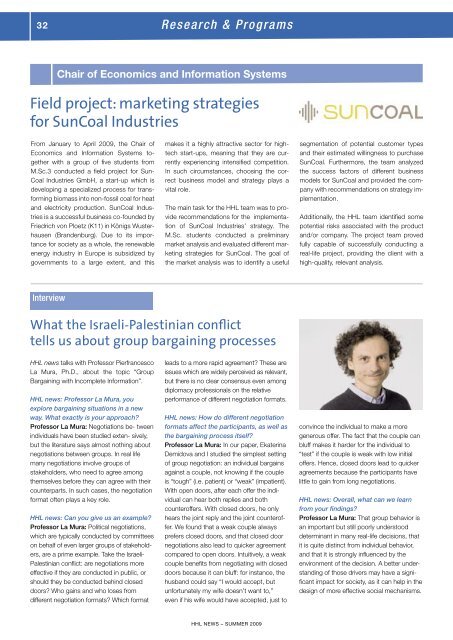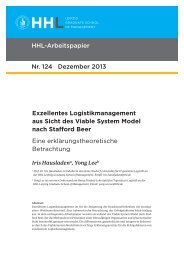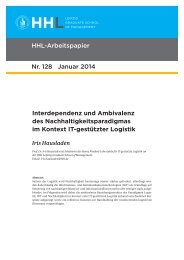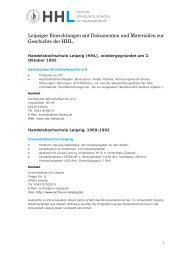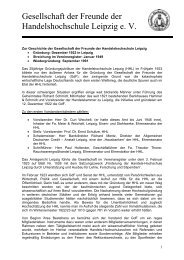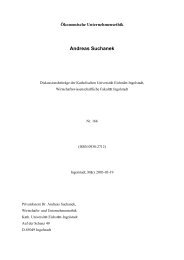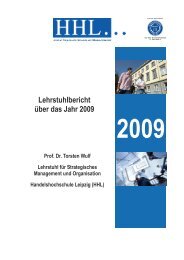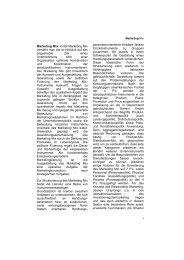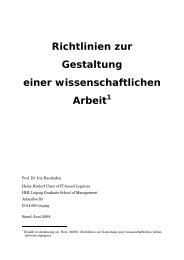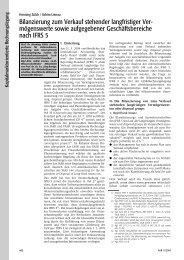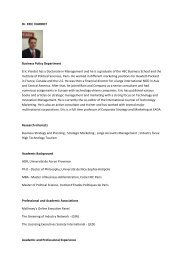Research & Programs - HHL Leipzig Graduate School of Management
Research & Programs - HHL Leipzig Graduate School of Management
Research & Programs - HHL Leipzig Graduate School of Management
Create successful ePaper yourself
Turn your PDF publications into a flip-book with our unique Google optimized e-Paper software.
32<br />
Interview<br />
<strong>HHL</strong> news talks with Pr<strong>of</strong>essor Pierfrancesco<br />
La Mura, Ph.D., about the topic “Group<br />
Bargaining with Incomplete Information”.<br />
<strong>HHL</strong> news: Pr<strong>of</strong>essor La Mura, you<br />
explore bargaining situations in a new<br />
way. What exactly is your approach?<br />
Pr<strong>of</strong>essor La Mura: Negotiations be- tween<br />
individuals have been studied exten- sively,<br />
but the literature says almost nothing about<br />
negotiations between groups. In real life<br />
many negotiations involve groups <strong>of</strong><br />
stakeholders, who need to agree among<br />
themselves before they can agree with their<br />
counterparts. In such cases, the negotiation<br />
format <strong>of</strong>ten plays a key role.<br />
<strong>HHL</strong> news: Can you give us an example?<br />
Pr<strong>of</strong>essor La Mura: Political negotiations,<br />
which are typically conducted by committees<br />
on behalf <strong>of</strong> even larger groups <strong>of</strong> stakehold-<br />
ers, are a prime example. Take the Israeli-<br />
Palestinian conflict: are negotiations more<br />
effective if they are conducted in public, or<br />
should they be conducted behind closed<br />
doors? Who gains and who loses from<br />
different negotiation formats? Which format<br />
<strong>Research</strong> & <strong>Programs</strong><br />
Chair <strong>of</strong> Economics and Information Systems<br />
Field project: marketing strategies<br />
for SunCoal Industries<br />
From January to April 2009, the Chair <strong>of</strong><br />
Economics and Information Systems to-<br />
gether with a group <strong>of</strong> five students from<br />
M.Sc.3 conducted a field project for Sun-<br />
Coal Industries GmbH, a start-up which is<br />
developing a specialized process for transforming<br />
biomass into non-fossil coal for heat<br />
and electricity production. SunCoal Industries<br />
is a successful business co-founded by<br />
Friedrich von Ploetz (K11) in Königs Wuster-<br />
hausen (Brandenburg). Due to its importance<br />
for society as a whole, the renewable<br />
energy industry in Europe is subsidized by<br />
governments to a large extent, and this<br />
makes it a highly attractive sector for hightech<br />
start-ups, meaning that they are currently<br />
experiencing intensified competition.<br />
In such circumstances, choosing the correct<br />
business model and strategy plays a<br />
vital role.<br />
The main task for the <strong>HHL</strong> team was to provide<br />
recommendations for the implementation<br />
<strong>of</strong> SunCoal Industries’ strategy. The<br />
M.Sc. students conducted a preliminary<br />
market analysis and evaluated different marketing<br />
strategies for SunCoal. The goal <strong>of</strong><br />
the market analysis was to identify a useful<br />
What the Israeli-Palestinian conflict<br />
tells us about group bargaining processes<br />
leads to a more rapid agreement? These are<br />
issues which are widely perceived as relevant,<br />
but there is no clear consensus even among<br />
diplomacy pr<strong>of</strong>essionals on the relative<br />
performance <strong>of</strong> different negotiation formats.<br />
<strong>HHL</strong> news: How do different negotiation<br />
formats affect the participants, as well as<br />
the bargaining process itself?<br />
Pr<strong>of</strong>essor La Mura: In our paper, Ekaterina<br />
Demidova and I studied the simplest setting<br />
<strong>of</strong> group negotiation: an individual bargains<br />
against a couple, not knowing if the couple<br />
is “tough” (i.e. patient) or “weak” (impatient).<br />
With open doors, after each <strong>of</strong>fer the indi-<br />
vidual can hear both replies and both<br />
counter<strong>of</strong>fers. With closed doors, he only<br />
hears the joint reply and the joint counter<strong>of</strong>fer.<br />
We found that a weak couple always<br />
prefers closed doors, and that closed door<br />
negotiations also lead to quicker agreement<br />
compared to open doors. Intuitively, a weak<br />
couple benefits from negotiating with closed<br />
doors because it can bluff: for instance, the<br />
husband could say “I would accept, but<br />
unfortunately my wife doesn’t want to,”<br />
even if his wife would have accepted, just to<br />
<strong>HHL</strong> NEWS – SUMMER 2009<br />
segmentation <strong>of</strong> potential customer types<br />
and their estimated willingness to purchase<br />
SunCoal. Furthermore, the team analyzed<br />
the success factors <strong>of</strong> different business<br />
models for SunCoal and provided the company<br />
with recommendations on strategy implementation.<br />
Additionally, the <strong>HHL</strong> team identified some<br />
potential risks associated with the product<br />
and/or company. The project team proved<br />
fully capable <strong>of</strong> successfully conducting a<br />
real-life project, providing the client with a<br />
high-quality, relevant analysis.<br />
convince the individual to make a more<br />
generous <strong>of</strong>fer. The fact that the couple can<br />
bluff makes it harder for the individual to<br />
“test” if the couple is weak with low initial<br />
<strong>of</strong>fers. Hence, closed doors lead to quicker<br />
agreements because the participants have<br />
little to gain from long negotiations.<br />
<strong>HHL</strong> news: Overall, what can we learn<br />
from your findings?<br />
Pr<strong>of</strong>essor La Mura: That group behavior is<br />
an important but still poorly understood<br />
determinant in many real-life decisions, that<br />
it is quite distinct from individual behavior,<br />
and that it is strongly influenced by the<br />
environment <strong>of</strong> the decision. A better under-<br />
standing <strong>of</strong> those drivers may have a signi-<br />
ficant impact for society, as it can help in the<br />
design <strong>of</strong> more effective social mechanisms.


